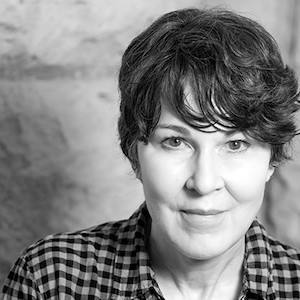Alumni Spotlight: Mary Jo Bang '98
The Alumni Spotlight is a place to hear from the School of the Arts alumni community about their journeys as artists and creators.
Mary Jo Bang '98 is the author of eight books of poems—including A Doll for Throwing and Elegy, which received the National Book Critics Circle Award—a translation of Dante’s Inferno, illustrated by Henrik Drescher, and a translation of Purgatorio. Her translation of Matthias Göritz’s poem, “Colonies of Paradise,” received a Gulf Coast Translation Prize. She and co-translator Yuki Tanaka received the Denver Quarterly’s Cole Swensen Translation Prize and the RHINO Translation Prize for poems by Shuzo Takiguchi. The recipient of a Hodder Fellowship, a Guggenheim Fellowship, and a Berlin Prize Fellowship, she teaches at Washington University in St. Louis.

Was there a specific faculty member or peer that especially inspired you while at the School of the Arts? If so, who and how?
Mary Jo Bang (MJB): I There was a faculty member and two peers who not only inspired me, but actually taught me to write. I learned from my teacher, Lucie Brock-Broido, how to let language instead of narrative do the work of creating the poem’s lyric heat. And how to manifest my own complicated interiority on the page. Early on, she told me I needed to expand my sense of what does and doesn’t belong in a poem, and to expand my lexicon. She also once told me that I should aim towards surrealism, but not to worry about getting there, because I never would. Just keep moving toward it, she said. It was excellent advice and I’ve followed it ever since.
From Timothy Donnelly, one of my classmates, I learned to marry a poem’s formal elements to its subjectivity in a way that gave the poem both complexity and authority. And from Mónica de la Torre, another classmate, I learned how to let disjunction and indeterminacy mimic the mind’s associational leaps. All three taught me how to dismantle a poem in order to see how it works, and how to read my own work with a useful degree of remove. By example, they taught me to read widely and not to imitate others but to put my own inimitable stamp on whatever I wrote.
What was your favorite or most memorable class while at the School of the Arts?
Mary Jo Bang (MJB): My most memorable class was far from being my favorite class. It was instead memorable for how much I learned, and how important what I learned has been to me as a poet. That class was Alfred Corn’s prosody class. Unlike many of the other students, I came to the class knowing nothing about prosody. I hadn’t been an English major. I’d studied sociology, and after that, medicine, and then photography. I didn’t know how to metrically scan a poem, and I certainly had no idea about how to write in meter or form. It was difficult to know nothing, surrounded by those who knew all of those things and more. Both speaking and listening to speech are usually so thoughtless that it takes a great deal of attention to recognize the patterns.
You have to train your ear to hear the way stress falls on some syllables, and not on others, and how to measure the relative stress of one syllable against the sound-weight of the word or syllable next to it. To understand what sound can do in a poem, and to manipulate the sonic echoes with any degree of sophistication, requires years of practice. Trying to write formal poems that were metrically correct, had interesting rhyme schemes, and were interesting to read—as failed as those early efforts were—taught me the expressive potential of sound in poetry. I didn’t realize at the time that I was beginning something that I would dedicate myself to for the rest of my writing life, but that is, in fact, what I’ve done. I’m still learning with every poem I write and Alfred Corn and his prosody book, The Poem’s Heartbeat, are part of the mind with which I write.